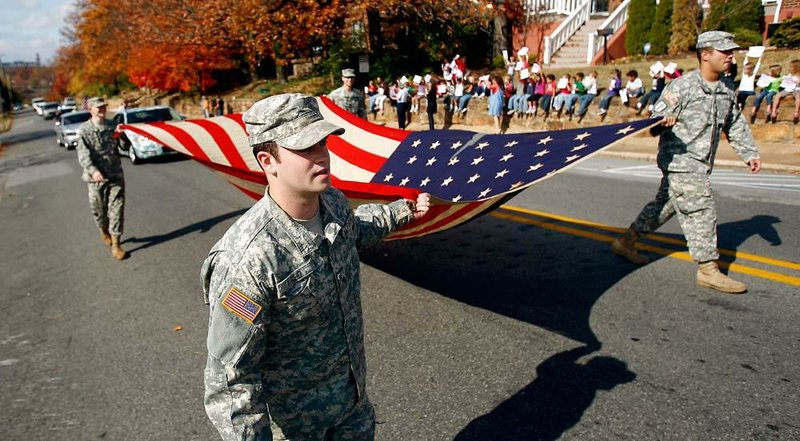LITTLE ROCK — As a retired member of the U.S. Army Reserve, Col. Glenn Ballard knows the demands of military service. He has seen servicemen struggle when returning home from deployment. He has experienced it first-hand himself, first in Vietnam and again during the Persian Gulf War, and he thinks churches can provide much-needed support.
With the help of the national outreach Military Ministries, Ballard and a couple of friends have developed a website to provide resources to houses of worship in Arkansas. The site, arkansasmilitaryministry.org, offers information, educational tools and a how to guide for churches interested in starting a military ministry.
“It is our mission as a church to go out and make disciples,” Ballard said. “What better way to dothat than coming alongside someone asking for help. Start sharing. It’s a way to minister to soldiers and help them deal with really knowing where the power to heal comes from, and that’s through Jesus Christ.”
Ballard retired from the Army Reserve in 2006 after 31 years of service. His last job was as commander of a training brigade in San Antonio where he taught combat medics being deployed to Iraq.
“I had the responsibility of taking care of the soldiers and their families when they returned home,” he said.
Ballard said he couldn’t provide the spiritual support he knew many soldiers needed, and thought churches were the obvious answer. So when he retired, he began thinking of ways to start a ministry and that’s when he discovered Military Ministries. The outreach is a ministry of Campus Crusade for Christ. He attended a “Building Bridges” program offered by the organization.
“I was blown away with what they were doing to teach churches about post-traumatic stress and the injuries of war, and I said, ‘We’ve got to do this in Arkansas,’” Ballard said.
With help from the group, Ballard gathered a few military friends - Steve Sullivan, chaplain with Veterans Affairs in Arkansas and 1st Lt. Scott Eaton, with the Arkansas National Guard - and presented a workshop in 2010. More than 100 representatives from churches participated. He followed up by developing the website to serve as a resource for congregations, anticipating many questions and requests.
He got none.
“Not one,” he said, lamenting the fact that no one called or seemed to follow through with starting a ministry in their own churches.
This year, he’s trying to get the word out and encourage churches to get involved in light of President Barack Obama’s announcement that all U.S. troops will be out of Iraq by the end of the year.
Ballard anticipates more veterans returning home or moving to Arkansas who will need spiritual support. He’s hoping older veterans will play a key role in getting churches involved.
“What I want to do is have a bullhorn and call veterans to fall in and ask them, ‘Do you remember when you came back? Can you give some time to soldiers?’” he said. “You’re always in the military. Let’s get involved.”
Ballard said existing ministries in churches can be used to meet the needs of soldiers and their families. He said the Divorce Recovery program at his own church, Fellowship Bible Church in Little Rock, is one very relevant to servicemen.
“They are coming back with a 70 [percent] to 75 percent divorce rate, and their lives are changed a lot,” he said. “They lose their jobs because employers can’t take care of their needs, and now they are separated, divorced and jobless.”
Ballard said the idea that once troops return home everything should be fine is a myth.
“They are injured and some of them don’t even know it,” he said.
The guide on the website offers information and ideas for churches, including suggestions on how to get started by establishing a team, researching available resources and getting the congregation involved. The guide includes a chart of common existing church ministries and the needs of military members and families, and shows how they often intersect. That can be a starting point for a congregation, Ballard said.
Eaton, who is a candidate for the chaplaincy, serves with the 2nd Battalion, 153rd Infantry Brigade of the Arkansas National Guard. He said one of the biggest worries for his fellow soldiers is what’s going on at home while they are away. Is their family OK?
“A soldier who is combat ready, lying in a fighting position, worried about a spouse or kids, they are not really in the game,” he said.
Eaton said churches can help by reaching out to their families while they are deployed.
“I worry about my oldest daughter. She’s a daddy’s girl and I worry about what will happen when I leave for a long time,” he said. “But if I know my church is there as a resource, that can make all the difference in her life.”
Helping isn’t hard, he said. It can be as simple as mowing a lawn, volunteering to babysit or making a commitment to pray daily for the soldier and family.
“For me one of the greatest things the church has done is supporting me as a chaplain. They realize I need support,” Eaton said. “In my situation I have a whole bunch of soldiers who want to talk to me, but who do I talk to and rely on? I get it from my church.”
Eaton said churches of all sizes can get involved.
“You just need to start,” he said. “And we can show them simple, easy ways to help.”
Ballard said churches can begin by looking at their own congregations to see if they have active military personnel or veterans. Ask what they need and turn to the website for ideas, he said.
“Churches have a tremendous role to play,” Ballard said. “It starts by looking in your church [and asking], ‘Who needs help right now ?’”
Religion, Pages 14 on 10/29/2011
